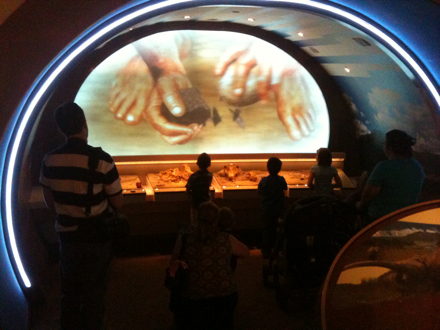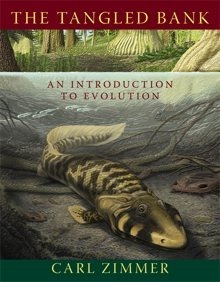Carl Zimmer's Blog, page 92
May 19, 2010
Old Charles Darwin Had A Farm…
 In my new podcast I take a look at Darwinian agriculture–how farmers can improve their crops by taking advantage of evolutionary history. I talk to Ford Denison of the University of Minnesota, who has done fascinating work plants such as soybeans and the bacteria that live in their roots and supply them with essential nitrogen. It's a complicated relationship, full of cooperation, conflict, cheating, and punishment. Check it out.
In my new podcast I take a look at Darwinian agriculture–how farmers can improve their crops by taking advantage of evolutionary history. I talk to Ford Denison of the University of Minnesota, who has done fascinating work plants such as soybeans and the bacteria that live in their roots and supply them with essential nitrogen. It's a complicated relationship, full of cooperation, conflict, cheating, and punishment. Check it out.

How Many Sparks in the Genome?
 Less than two percent of the human genome is made up of protein-coding genes. Fifty years ago, scientists launched an expedition of the other 98 percent. It has been a slow march for much of that time, but in recent years the pace has picked up, thanks to advances such as new ways to sequence DNA. Scientists are now generally agreed that some of the non-coding DNA falls into several categories, including
Less than two percent of the human genome is made up of protein-coding genes. Fifty years ago, scientists launched an expedition of the other 98 percent. It has been a slow march for much of that time, but in recent years the pace has picked up, thanks to advances such as new ways to sequence DNA. Scientists are now generally agreed that some of the non-coding DNA falls into several categories, including
–sites where proteins can bind in order to switch nearby genes on and off
–genes for RNA...
May 18, 2010
A Yardstick For The Nose
 My newest column for Discover is about that strangest of the senses, smell. An odor can be an overwhelming experience, and yet it's often impossible to put that experience into words. In fact, we're terrible at naming smells, despite being exquisitely sensitive to the differences between them. I take a look at some recent research that may bring us closer to resolving this paradox, with the invention of the first yardstick for the nose–a simple measurement of odor molecules that reveals a...
My newest column for Discover is about that strangest of the senses, smell. An odor can be an overwhelming experience, and yet it's often impossible to put that experience into words. In fact, we're terrible at naming smells, despite being exquisitely sensitive to the differences between them. I take a look at some recent research that may bring us closer to resolving this paradox, with the invention of the first yardstick for the nose–a simple measurement of odor molecules that reveals a...
May 17, 2010
How To Recognize the Anthropocene
Elizabeth Kolbert writes this morning about the Anthropocene, a new geological epoch marked by the dominance of our species. It may be hard to precisely mark its beginning, but here's why I think it will be easy for geologists 10 million years in the future to pinpoint layers of Anthropocene rocks.

May 16, 2010
Rendering Vitality [Science Tattoo]
 David writes, "My tattoos each mark–although in rather oblique and coded ways–life events, or at least transitions that are important to me (several are a rebus for my 1999 dissertation in post-structuralist political philosophy). This 10th tattoo, of Hemoglobin A, perhaps requires less decoding than many. Over the last couple years, I have had the opportunity to work with some amazing people, on the computer science side of things, who have built the world's fastest supercomputer–called
David writes, "My tattoos each mark–although in rather oblique and coded ways–life events, or at least transitions that are important to me (several are a rebus for my 1999 dissertation in post-structuralist political philosophy). This 10th tattoo, of Hemoglobin A, perhaps requires less decoding than many. Over the last couple years, I have had the opportunity to work with some amazing people, on the computer science side of things, who have built the world's fastest supercomputer–called
May 15, 2010
Smithsonian Hall of Human Origins: Just Go
 Having come down to Washington this weekend to give a talk, I knew I had to get over to the Smithsonian's new Hall of Human Origins. The Smithsonian's Briana Posiner was kind enough to take me around and tell me about what went into its creation. I suppose I could pretend to be a professional museum reviewer and present a lengthy description of the hall, tell you what I liked, give the obligatory "But nothing is ever perfect," indulge in some musings on the state of museumology, and on and...
Having come down to Washington this weekend to give a talk, I knew I had to get over to the Smithsonian's new Hall of Human Origins. The Smithsonian's Briana Posiner was kind enough to take me around and tell me about what went into its creation. I suppose I could pretend to be a professional museum reviewer and present a lengthy description of the hall, tell you what I liked, give the obligatory "But nothing is ever perfect," indulge in some musings on the state of museumology, and on and...
May 13, 2010
Study Reveals Dolphins Lack Capacity To Mock Celebrity Culture
 Here's a brilliant piece of science-writing satire from the Onion. I find it particularly funny because I've been writing a lot recently about the evolution of human uniqueness. It's so easy to mix up "unique" with "totally awesome." The conflation flatters my readers, and myself. That's the sort of self-importance that great satire can deflate so quickly.
Here's a brilliant piece of science-writing satire from the Onion. I find it particularly funny because I've been writing a lot recently about the evolution of human uniqueness. It's so easy to mix up "unique" with "totally awesome." The conflation flatters my readers, and myself. That's the sort of self-importance that great satire can deflate so quickly.
[Hat tip, Ed Yong ]

May 12, 2010
Evolution in Alabama
Earlier today I noted a weird situation in Alabama, with a teacher-union-funded ad attacking a candidate for governor for believing in evolution, and the candidate declaring himself a defender of creationism in the schools. I wondered who would speak up for science in Alabama. But I'd be remiss not to point out that good research in evolutionary biology does get done there. For example:
Beatrice Hahn studies the evolution of HIV from chimpanzee-infecting viruses.
Marshal Abrams studies the...
Will Anyone In Alabama Speak For Evolution?
Let's get this straight.
An ad attacks a Republican candidate for governor in Alabama, Bradley Byrne, for the horrible crime of defending the teaching of evolution.
Byrne lashes back, stating
As a member of the Alabama Board of Education, the record clearly shows that I fought to ensure the teaching of creationism in our school textbooks. Those who attack me have distorted, twisted and misrepresented my comments and are spewing utter lies to the people of this state.
The nerve of some people to m...
The American Biology Teacher Reviews The Tangled Bank: "Truly Unique"
 I was delighted to discover this morning that the journal The American Biology Teacher gives thumbs-up to The Tangled Bank. From the review:
I was delighted to discover this morning that the journal The American Biology Teacher gives thumbs-up to The Tangled Bank. From the review:
"For students of evolution or scholars who want to know the specifics about particular evolutionary processes, this is an excellent read. The fact that it is understandable to beginners and fascinating to scientists makes this book truly unique and valuable."












